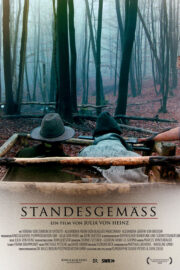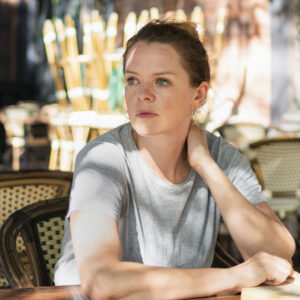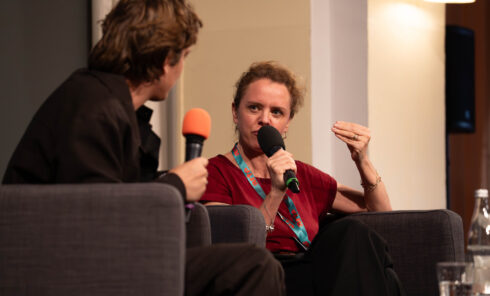Standesgemäss
The film portrays three single aristocratic women caught between traditional expectations and everyday life, between stately home and prefabricated housing estate, torn between the assumptions of their parents, which they can no longer fulfill, and their own internalized aspirations.
If they wish to remain part of the aristocracy, they will need to marry an aristocratic man or remain single – for within the aristocracy, the ‘patrilineal principle’ applies.
Countess Alexandra von Bredow once lived a wild life filled with lavish balls. Today, she lives in a one-room flat and makes a living by producing pearl necklaces. At the age of 48, after depression and many setbacks, she finally finds true love.
Baroness Alexandra von Beaulieu Marconnay, oboist and teacher, enjoys a close relationship with her mother following her father’s death. When she moves to a new city, her aristocratic connections help her to settle in. However, she finds it difficult to step out of her mother’s shadow and that of her influential ancestors.
Verena von Zerboni di Sposetti enjoyed an elite education at a girls’ boarding school and studied law. By deciding to give up her career as a lawyer and do something completely different, she catapults herself out of aristocratic society and faces a complete reorientation.
A film about three outsiders and the bizarre microcosm of the German aristocracy.
Cast
- Verena von Zerboni di Sposetti
- Alexandra Freiin von Beaulieu-Marconnay
- Alexandra Gräfin von Bredow
- Alexandra Brandner
- Dr. Horst von Zerboni di Sposetti
- Constanze von Eyb
- Marco d' Avola
- Andrea Freifrau von Beaulieu-Marconnay
- Prof. Dr. jur. Dr. jur. habil. Gerrick von Hoyningen-Huene
- Dr. Iris Baronin von Hoyningen-Huene
- Ruth Gräfin von Bredow
- Otto Dietrich Graf von und zu Egloffstein
- Peter Birk

Standesgemäss
Julia von Heinz
- Documentary
- Production Country / Year
- Germany 2008
- Language
- dt. OF m. engl. UT
- Format
- DCP, Color, 87min
1.78:1 (16:9), Other DCP audio format
Director & Crew

Julia von Heinz
Born in 1976 in Berlin. Studied and attained a Doctorate degree at the Film University Babelsberg Konrad Wolf. Active as a director, screenwriter, producer and professor.
Filmography
| 2001 | Doris | Kurzfilm | |
| 2003 | Lucie & Vera | Kurzfilm | 2003 |
| 2007 | Was am Ende zählt | Spielfilm | |
| 2008 | Alles was am Ende zählt | Spielfilm | |
| Standesgemäß | Dokumentarfilm | 2008 | |
| 2012 | Hanni und Nanni 2 | Spielfilm | |
| Rosakinder | Dokumentarfilm Co-Regie |
2012 | |
| 2013 | Hannas Reise | Spielfilm | 2013 |
| 2015 | Ich bin dann mal weg | Spielfilm | |
| 2017 | Katharina Luther | TV-Film | |
| 2018 | Für immer und dich | TV-Film | 2018 |
| 2020 | Und morgen die ganze Welt | Spielfilm | 2020 |
| 2021 | Eldorado Kadewe | TV-Serie | |
| Isolation – meine Väter | Episodenfilm Co-Regie |
2021 | |
| 2024 | Treasure | Spielfilm | |
| She gets it from me |
Initially, my debut film Was am Ende zählt didn’t achieve the success and visibility that would have been necessary to produce another feature film. It took two years to find a distributor who would release it in cinemas, with three copies. MissingFilms became far more than a distributor for me. Christos Acrivulis, who also distributes Rosa von Praunheim’s movies, became a friend. He was the person who began to include almost all my works in his program, including Standesgemäß. This documentary was made because a clever editor at BR found the subject so unusual that he didn’t want to see it fictionalized but recorded and verified against reality. That’s exactly what we did! It’s about single women from the nobility, outsiders who cannot find a partner suited to their social status. They are trapped in the rigid conventions of a class that acts all the more rigidly because it has ceased to exist in any real sense. For me and John Quester, who was my producer for the first time, the “patrilineal principle” still propagated by aristocratic associations became a symbol, a succinct expression of the patriarchal society in which we lived and worked. A society that still demands high status from men and assigns a subservient, subordinate role to women. The film turned out unexpectedly funny and more emotional than I could have imagined, and so it became the foundation of my career as a director. In 2009, it won the Young Talent Award for Directing at the Bavarian Television Awards, and in the same year, Was am Ende zählt won the Golden Lola for Best Children’s and Youth Film. I had gained a foothold as a director.
- Music Composer
- Matthias Petsche
- Producer
- Julia von Heinz
- John Quester
- Writer
- Julia von Heinz
- John Quester
- Sound
- David Urban
- Editor
- Frank Brummundt
- Director of Photography
- John Quester
- Marcus Winterbauer
- Axel Schneppat
- TV Commissioning Editor
- Thomas Sessner Sessner
- Dr. Gudrun Hanke-El Ghomri
